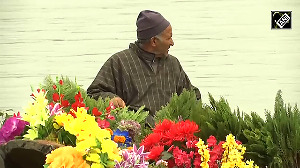Add another claim to the district's fame: It is still home to the wretched two-tumbler system, whereby commercial establishments like tea-stalls and hotels employ two sets of utensils -- one for the Dalits, and another for non-Dalits, thus perpetuating untouchability.
People's Watch, a human rights NGO based in Madurai, in a report on October 1 said untouchability was being practised in 22 villages of Tirunelveli district and spread over half its talukas.
The report said Dalits were served tea in different tumblers set aside for them, they were not allowed into temples, in some villages they were made to sit on the floor in hotels, barbers did not attend to them, nor were they allowed to pull the temple car on festivals.
And when anyone dies in the village, they were asked to spread the message to each household.
The last practice is common to all villages in south Tamil Nadu. Dalits are the harbingers of the news of death, and for this 'service' they are paid by the family of the deceased. They also get tips from relatives who they contact in faraway villages.
Vennilingapuram, Kammavoor and Rukmaniammalpuram fall within five kilometres of each other, and lie within the talukas of Alangulam and V K Pudhoor. There are four teashops in Vennilingapuram, and the owner of one of them denied he had two sets of tumblers for his customers. "I have stainless steel glasses for everyone as you can see," he told rediff.com, "It is true the two-tumbler system in prevalent in this area, you will find it in the neighbouring Kammavoor and Rukmaniammalpuram villages. There the Thevars are very arrogant. Here we treat the Dalits very well."
Even as he spoke, a young girl bought tea in her own mug, as did another man. A third youth, who was eyeing the conversation nervously, spoke out a safe distance from the shop.
He said, "That man is lying. It is true he has stainless steel glasses for everyone, but there are two sets. He gave you tea from a glass on his right. He has another set on his left, which he brings out when Dalits come to the shop."
At the village's Dalit colony came more confirmation. One of the men there insisted that the two-tumbler system was very much prevalent in the village, in fact in every village in the area. "Mostly we prefer making tea at home. It is the old men that go to the teashop and drink from different cups. Many shops give us tea in disposable plastic cups."
But he was stoic about it. "We have never complained, we accept it as a way of life. Some 15 years back some reporters wrote about this. All the Dalits who spoke to them were isolated in the village, and barred from teashops, provision stores, temples etc and were not allowed to use most of the roads in the village. They could not even go to work in the fields. Most of the Dalits in this village sided with the Thevars in this and did not talk to the rebel Dalits. Please do not use our names in your report. We don't want any problems here."
Other Dalits also added, "The two-tumbler system is the only evil. We are allowed into all the temples here. Otherwise the Thevars treat us well. This wasn't the case 20 years back. Then if we wanted water, it was poured into our hands and we drank it."
Another problem here for the Dalits is that most of them do not have any land of their own. They have to work in the Thevars' fields and hence do not want to antagonise them. They could lose their livelihood.
The panchayat president, Selvaraj, is well liked by the Dalits. "He is a good man, when we go to his house he makes us sit on a sofa," they say about him.
When rediff.com called Selvaraj on his cell phone he first denied that the two-tumbler system was prevalent in his village. When told that we were right there, he said to visit him at his finance company office. But he wasn't available there, his wife saying he would return late in the evening. Even his cell phone had been switched off.
The local legislator and former minister, Dr Poongothai, was more responsive. She told rediff.com, "I am shocked to know this, I wasn't aware of it. I will call for an all-community meeting immediately and make sure this is stopped."
Alangulam's tahsildar, A Abdul Hameed Khan, too denied any knowledge of this practice. He also called the local revenue inspector and asked her to go to the spot immediately and file a report the same evening, asking the inspector to visit the Dalit colony in particular.
After that the tahsildar discussed the matter with his deputy, aware they couldn't take any step that would inflame matters. "We are not aware of this because the Dalits never complained. We can take stringent action but cannot do anything that would start a caste war."
Khan felt using disposable plastic cups was the best solution, but he was worried the cups could pollute the soil.
All in all he was aware that he was sitting on a powder keg and it would require every ounce of his 35 years in service to solve the problem -- without ruffling feathers, and without hurting those he set out to help.






 © 2025
© 2025